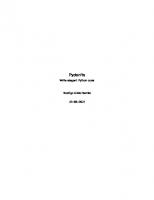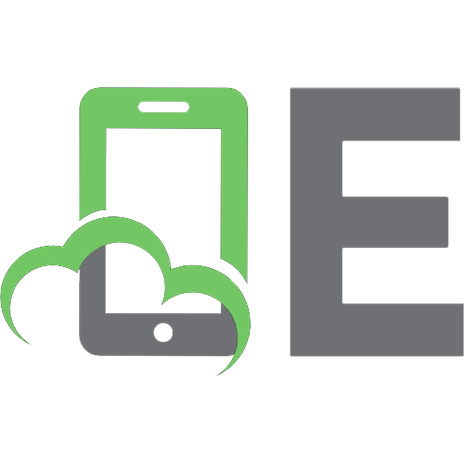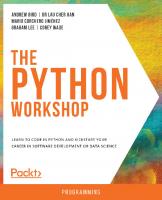How To Code in Python 3 9780999773000
This educational book introduces emerging developers to computer programming through the Python software development lan
382 96 587KB
English Pages 9 Year 2017
Table of contents :
1. Introduction
2. Python 2 vs Python 3: Practical Considerations
3. How To Install Python 3 and Set Up a Local Programming
Environment on Ubuntu 16.04
4. How To Install Python 3 and Set Up a Local Programming
Environment on macOS
5. How To Install Python 3 and Set Up a Local Programming
Environment on Windows 10
6. How To Install Python 3 and Set Up a Local Programming
Environment on CentOS 7
7. How To Install Python 3 and Set Up a Programming Environment on
an Ubuntu 16.04 Server
8. How To Write Your First Python 3 Program
9. How To Work with the Python Interactive Console
10. How To Write Comments
11. Understanding Data Types
12. An Introduction to Working with Strings
13. How To Format Text
14. An Introduction to String Functions
15. How To Index and Slice Strings
16. How To Convert Data Types
17. How To Use Variables
18. How To Use String Formatters
19. How To Do Math with Operators
20. Built-in Python 3 Functions for Working with Numbers
21. Understanding Boolean Logic
22. Understanding Lists
23. How To Use List Methods
24. Understanding List Comprehensions
25. Understanding Tuples
26. Understanding Dictionaries
27. How To Import Modules
28. How To Write Modules
29. How To Write Conditional Statements
30. How To Construct While Loops
31. How To Construct For Loops
32. How To Use Break, Continue, and Pass Statements when Working
with Loops
33. How To Define Functions
34. How To Use *args and **kwargs
35. How To Construct Classes and Define Objects
36. Understanding Class and Instance Variables
37. Understanding Inheritance
38. How To Apply Polymorphism to Classes
39. How To Use the Python Debugger
40. How To Debug Python with an Interactive Console
41. How To Use Logging
42. How To Port Python 2 Code to Python 3
1. Introduction
2. Python 2 vs Python 3: Practical Considerations
3. How To Install Python 3 and Set Up a Local Programming
Environment on Ubuntu 16.04
4. How To Install Python 3 and Set Up a Local Programming
Environment on macOS
5. How To Install Python 3 and Set Up a Local Programming
Environment on Windows 10
6. How To Install Python 3 and Set Up a Local Programming
Environment on CentOS 7
7. How To Install Python 3 and Set Up a Programming Environment on
an Ubuntu 16.04 Server
8. How To Write Your First Python 3 Program
9. How To Work with the Python Interactive Console
10. How To Write Comments
11. Understanding Data Types
12. An Introduction to Working with Strings
13. How To Format Text
14. An Introduction to String Functions
15. How To Index and Slice Strings
16. How To Convert Data Types
17. How To Use Variables
18. How To Use String Formatters
19. How To Do Math with Operators
20. Built-in Python 3 Functions for Working with Numbers
21. Understanding Boolean Logic
22. Understanding Lists
23. How To Use List Methods
24. Understanding List Comprehensions
25. Understanding Tuples
26. Understanding Dictionaries
27. How To Import Modules
28. How To Write Modules
29. How To Write Conditional Statements
30. How To Construct While Loops
31. How To Construct For Loops
32. How To Use Break, Continue, and Pass Statements when Working
with Loops
33. How To Define Functions
34. How To Use *args and **kwargs
35. How To Construct Classes and Define Objects
36. Understanding Class and Instance Variables
37. Understanding Inheritance
38. How To Apply Polymorphism to Classes
39. How To Use the Python Debugger
40. How To Debug Python with an Interactive Console
41. How To Use Logging
42. How To Port Python 2 Code to Python 3

- Author / Uploaded
- Lisa Tagliaferri
- Lisa Tagliaferri
- Similar Topics
- Computers
- Programming: Programming Languages
![How to Code in Python 3 [EPUB ed.]
9780999773000](https://ebin.pub/img/200x200/how-to-code-in-python-3-epubnbsped-9780999773000.jpg)

![Python How-To: 63 techniques to improve your Python code [1 ed.]
161729974X, 9781617299742](https://ebin.pub/img/200x200/python-how-to-63-techniques-to-improve-your-python-code-1nbsped-161729974x-9781617299742.jpg)

![Mastering Python for Bioinformatics: How to Write Flexible, Documented, Tested Python Code for Research Computing [1 ed.]
1098100883, 9781098100889](https://ebin.pub/img/200x200/mastering-python-for-bioinformatics-how-to-write-flexible-documented-tested-python-code-for-research-computing-1nbsped-1098100883-9781098100889.jpg)



